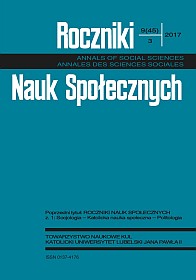Transparency of the Polish Government Structure in the Network Perspective
Abstrakt
Transparentność struktury polskiego rządu w perspektywie sieci
Celem artykułu jest analiza kryzysu konstytucyjnego, który miał miejsce w Polsce po wyborach parlamentarnych w 2015 r., w perspektywie sieciowej. Przeprowadzone badania koncentrują się na ukazaniu braku przejrzystości działań rządu Prawa i Sprawiedliwości podczas wskazanego kryzysu. Dzięki użyciu analizy sieci (SNA) jako głównej metody badawczej, w artykule analizie poddane zostały nieformalne relacje pomiędzy głównymi aktorami politycznymi, które w znaczący sposób wpłynęły na działania rządu w tym okresie. W tym celu podjęta została próba rekonstrukcji najważniejszych wydarzeń na polskiej scenie politycznej, odnoszących się do tematu badań, w badanym okresie czasu.
Bibliografia
Atteveldt W. van, Semantic network analysis: techniques for extracting, representing and querying media content, Charleston, SC: BookSurge 2008.
Benedikter R. & Karolewski I., Poland‘s conservative turn of 2015: Where are its real origins?, in: Europe in Trouble, ed. H. Marhold, Nomos 2016, pp. 81-88.
Berelson B., Content analysis in communication research, New York: Hafner Press 1984.
Brin S. & Page L., The Anatomy of a Large-scale Hypertextual Web Search Engine, in: Proceedings of the Seventh International Conference on World Wide Web 7, Amsterdam, The Netherlands: Elsevier Science Publishers B. V. 1998, pp. 107-117.
Domański H., A New Dimension of Social Stratification in Poland? Class Membership and Electoral Voting in 1991-2001, “European Sociological Review” 24(2)/2008, pp. 169-182.
Freeman L.C., Centrality in social networks conceptual clarification, “Social Networks” 1(3)/1978, pp. 215-239.
Granovetter M., The Strength of Weak Ties, “American Journal of Sociology” 78(6)/1973, pp. 360-1380.
Garlicki L.L., The Experience of the Polish Constitutional Court, in: Constitutional Justice, East and West. Democratic Legitimacy and Constitutional Courts in Post-Communist Europe in a Comparative Perspective, ed. W. Sadurski, The Hague–London–New York: Kluwer Law International 2007, pp. 265-282.
Krippendorff K., Content analysis: an introduction to its methodology, 2nd ed, Thousand Oak: SAGE Publications 2004.
Lin N., Social capital: a theory of social structure and action, Cambridge, UK–New York: Cambridge University Press 2001.
Lin N., A network theory of social capital, in: The handbook of social capital, ed. D. Castiglione, J.W. van Deth, & G. Wolleb, New York: Oxford University Press 2008, pp. 50-70.
Marcinkiewicz K., Stegmaier M., The parliamentary election in Poland – October 2015, “Electoral Studies” 41/2016, pp. 221-224.
Markoff J., Shapiro G. & Weitman S.R., Toward the Integration of Content Analysis and General Methodology, “Sociological Methodology” 6/1975, pp. 1-58.
Markowski R., The Polish parliamentary election of 2015: a free and fair election that results in unfair political consequences, West European Politics 39(6)/2016, pp. 1311-1322.
Nooy W. de, Mrvar A. & Batagelj V., Exploratory social network analysis with Pajek, New York: Cambridge University Press 2005.
Opinion on Amendments to the Act of 25 June 2015 on the Constitutional Tribunal of Poland, Adopted by the Venice Commission on 11 March 2016, http://www.venice.coe.int/webforms/documents/default.aspx?pdffile=CDL-AD(2016)001-e, [20.05.2017].
Pennebaker J.W., Francis M.E. & Booth R.J., Linguistic Inquiry and Word Count. Mahwah, N.J.: LEA Software and Alternative Media, Inc., 2001.
PKW (State Electoral Commission), www.parlament2015.pkw.gov.pl, [15.05.2017].
Stanley B., Confrontation by default and confrontation by design: strategic and institutional responses to Poland’s populist coalition government, “Democratization” 23(2)/2015, pp. 263-282.
Stępińska A., Lipiński A., Hess A. & Piontek D., Poland: A Fourth Wave of Populism?, in: Populist Political Communication in Europe, ed. T. Aalberg [et all], London: Routledge 2017, pp. 311-325.
Szczerbiak A., Poles Together? The Emergence and Development of Political Parties in Postcommunist Poland, Budapest: Central European University Press 2001.
Szuleka M., Wolny M., Szwed M. (2016), The Constitutional Crisis in Poland 2015-2016, http://www.hfhr.pl/wp-content/uploads/2016/09/HFHR_The-constitutional-crisis-in-Poland-2015-2016.pdf, [18.05.2017].
The Constitutional Tribunal Act of 22 July 2015, http://www.venice.coe.int/webforms/documents/default.aspx?pdffile=CDL-REF(2016)052-e, [23.05.2017].
Tamkin E., Polish Ruling Party Passed Unconstitutional Law, Now Controls Constitutional Tribunal, “Foreign Policy”, 2016, http://foreignpolicy.com/2016/12/19/polish-ruling-party-passed-unconstitutional-laws-now-controls-constitutional-tribunal-trump-law-justice/, [18.05.2017].
Urban J., Bulkow K., Tracing Public Opinion Online – An Example of Use for Social Network Analysis in Communication Research, “Procedia-Social and Behavioral Sciences” 100/2013, pp. 108-126.
Wałęsa L., The State of Democracy in Poland and Europe, “Polish Political Science Yearbook” 45/2016, pp. 157-165.
This paper is a part of the research project no. 2015/19/B/HS5/00426 financed by Polish National Science Centre.
Copyright (c) 2017 Roczniki Nauk Społecznych

Utwór dostępny jest na licencji Creative Commons Uznanie autorstwa – Użycie niekomercyjne – Bez utworów zależnych 4.0 Międzynarodowe.


